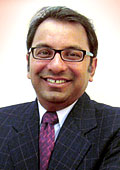 |
| UTV's Srewvala: New show |
If UTV has its way, you
won't need to wait for the next film festival in town to catch
films made by maverick directors Akira Kurosawa and Francois Truffaut.
The Mumbai-headquartered media and entertainment major has set
up UTV Palador, a 360 degree initiative in world cinema under
the brand name of 'Olive Collections' with three verticals: A
television channel, a DVD label and theatrical releases. "We
are investing $15 million (Rs 70 crore) over the next three years
to acquire 1,000 titles across 20 countries that have won over
3,000 (cumulative) awards. Initially, we will invest $3-3.5 million
(Rs 13-15 crore)," says Ronnie Screwvala, Chairman, UTV.
Screwvala estimates the non-Indian language movie segment to
be worth Rs 1,500 crore by 2009, and UTV Palador could grab 20
per cent of that pie with its focus on world cinema via its three
prongs. "The main revenue source for us will be dvds and
the channel. We plan to launch the TV channel in 6-8 months. The
theatrical release will be mainly a marketing tool," adds
Screwvala. Come April, 20 theatres across the country will release
the Olive Collection films with two shows daily that will account
for nearly 15,000 shows per annum. The Olive DVD Collection will
be released in a phased manner. UTV will be releasing 15-20 titles
each month and they will be priced at Rs 799. The TV Channel will
take six-eight months to launch.
Meantime, UTV has cemented a relationship with Rakeysh Omprakash
Mehra (who directed the UTV-produced Rang De Basanti), by tying
with his production house titled Rakeysh Omprakash Mehra Productions
(romp) to co-produce four films with a total outlay of Rs 280
crore.
-Anusha Subramanian
Friedman
Will Approve
FlatWorld spots overseas targets, and funds
their buyouts!
 |
| FlatWorld's Gupta: Dealmaker |
If you're a private equity
firm in India but can't find any reasonably-priced assets around,
what do you do? Well, you could wait for valuations to cool off.
Or, like FlatWorld Capital, a firm that traditionally invests
in North American services companies, you could take the cross-border
route and try spotting overseas targets for Indian promoters.
Raj Gupta, Partner at FlatWorld, explains that the firm first
identifies potential Indian businesses, then goes with them to
the US to do the due diligence of the US asset and then funds
the acquisition. The last step is to ultimately merge the foreign
entity with the Indian company. "In the US, we have two entities
in the IT services space: The first with $104 million (Rs 457.6
crore) in revenues is part of a conglomerate and the second is
an independent company with $43 million (Rs 189.2 crore) in revenues.
I am talking to Indian it companies (in the top 25) for the acquisitions,"
he discloses.
FlatWorld Capital plans to invest $200 million (Rs 880 crore)
a year to assist the Indian companies (primarily by financing
acquisitions). Apart from it and BPO services companies, FlatWorld
is looking at companies in the human resources, marketing and
healthcare services sectors. The PE firm says it looks at over
500 deals globally a year, and in 2007, it plans to close between
two and five transactions in India.
-Pallavi Srivastava
Googling
India
The domestic operations are off to
a flying start.
 |
| Google's Cassidy: It's going great for
her |
Sukhinder Singh Cassidy, vice-President,
Asia-Pacific, Google, has at least two good reasons to feel smug
about India. For one, Google's research and development team in
Bangalore has launched new products like Google Finance and Blogger's
new Hindi transliteration tool. For another, the global operations
team in Hyderabad is growing (though, Google did not disclose
headcount numbers), and its sales teams in Delhi and Mumbai are
selling more and more adverts as India's online economy starts
to boom. Third party estimates reckon the size of the 'AdWords'
market in India at Rs 100-150 crore (Google would not disclose
figures).
Google has now appointed Shailesh Rao from its Mountain View,
California office as Managing Director of its Indian operations.
Rao, who previously headed Google's burgeoning local search business,
is expected to also give Google India a slightly more local focus.
Cassidy is cagey about revealing whether Google is about to unveil
a local search product in India. "We have the product and
we will bring it to India, but I can't disclose when," she
shrugs.
However, Google's largest rivals Yahoo! and msn (now Windows
Live) are both about to launch local search services and city-specific
websites (Yahoo! is beta testing Yahoo! Ourcity). And with several
Indian web entrepreneurs too entering the space (Burpp and Guruji),
Google's local services for India might be on the horizon sooner
rather than later. At the same time, the company is also populating
its Google Maps service with Indian Geographic Information System
(GIS) information.
Google has never projected itself as an overarching company
that dominates the internet; Cassidy believes Google is a company
that spurs innovation. "Look at the number of companies that
have sprung up that use Google, companies that use mash-ups of
Google Maps and Google Earth to offer location-based services,
and companies that have seen their business improve thanks to
our AdWords advertising programme. At the same time, Google has
helped online publishers monetise their content through our AdSense
publishers' programme. In India, we have used resellers to sell
ad space on our advertising service and the programme has been
a huge success. I would like to believe that Google is an enabler
of companies."
Along with a host of new services, Google is also setting up
a parallel R&D centre in Gurgaon. "India has a huge pool
of talented people and we realise there are people in the Delhi
region as well whom we want on board," Cassidy says. The
company also plans to slowly increase the number of services it
offers in Indian languages. "With the rising number of people
accessing the internet in India, it is quite obvious that some
of them will want services in their own languages," Rao says.
"We already offer search services in several Indian languages
and the new Hindi transliteration tool on Blogger is hopefully
the first of many tools we will develop for India," adds
Cassidy.
But Google has also had its fair share of problems in India,
not least of which was the controversy surrounding Google Earth
where anyone could see satellite imagery of what the Indian government
classified as 'sensitive' locations such as Rashtrapati Bhavan
and nuclear power facilities. Andrew McLaughlin, Senior Policy
Counsel, Google, points out that the company has faced this problem
in other countries as well (including the US). "You have
to remember there are 20 companies from where anybody can buy
such images and that is what we tell governments. We have democratised
the process, but, yes, we are working with governments."
(Google has blurred out images of places like the White House
on Google Earth).
As the Indian internet economy grows, Google, unquestionably
the world's largest internet company, with a market capitalisation
of $145 billion, wants to be part of the Indian internet boom.
It's made a dream start.
-Kushan Mitra
|







